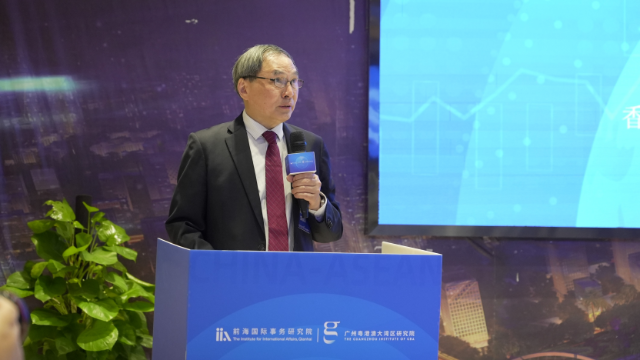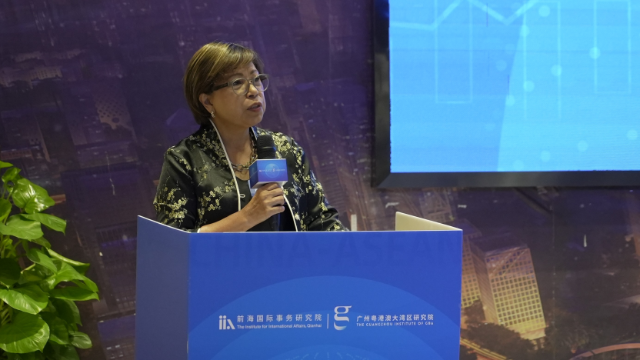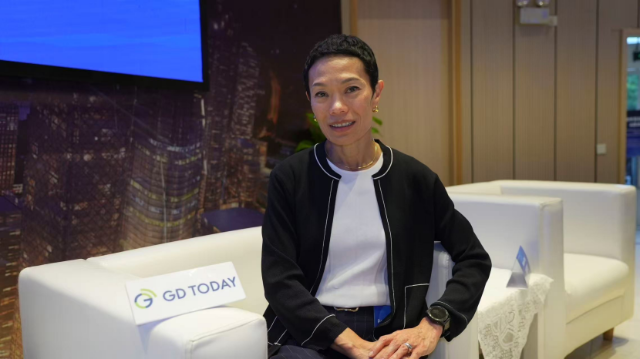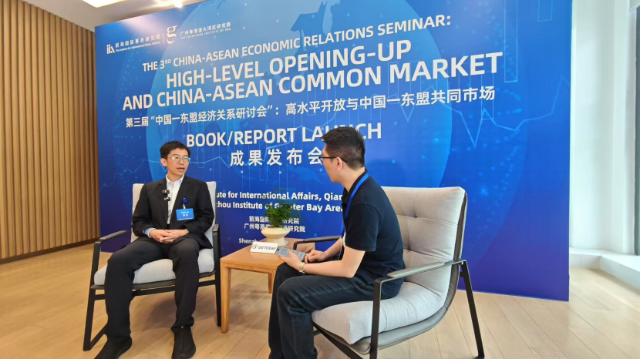Experts from China, Malaysia, and Thailand have called for China and ASEAN countries to expedite the establishment of a China-ASEAN common market to promote trade stability and development in Asia amid Donald Trump's tariffs.
This appeal was made during interviews with experts by GDToday at the 3rd China-ASEAN Economic Relations Seminar held in Shenzhen from April 26 to 27, themed "High-Level Opening-Up and China-ASEAN Common Market."
The seminar was co-organized by the Institute for International Affairs, Qianhai at the Chinese University of Hong Kong (Shenzhen), and the Guangzhou Institute of the Greater Bay Area.

Zheng Yongnian delivers welcome remarks at the 3rd China-ASEAN Economic Relations Seminar in Shenzhen on April 27. (GDToday Photo)
Zheng Yongnian, Dean of the Institute for International Affairs, Qianhai at the Chinese University of Hong Kong (Shenzhen), and Chairman of the Guangzhou Institute of the Greater Bay Area, emphasized the necessity of a China-ASEAN common market in light of Trump's tariffs.
"Trump is using economic means to force these ASEAN countries to take sides. I believe these countries will make rational choices," noted Zheng.
He elaborated that China is assisting ASEAN in achieving industrialization, particularly in the middle and low end of the industrial spectrum. The Belt and Road Initiative, as he observes, aims to help ASEAN countries build the infrastructure necessary for economic take-off.

Rebecca Fatima Sta Maria delivers her keynote speech at the 3rd China-ASEAN Economic Relations Seminar in Shenzhen on April 27. (GDToday Photo)
Rebecca Fatima Sta Maria, Former Secretary-General of the Malaysian Ministry of International Trade and Industry, views the tariffs imposed by the US as an opportunity for ASEAN and China to reset their strategies and deepen economic integration.
Maria reflected on the economic ties between ASEAN and China, recalling that the third round of negotiations for the China-ASEAN Free Trade Area (CAFTA) concluded in October last year, along with the Regional Comprehensive Economic Partnership(RCEP), which has been in force for three years.
With foundational agreements like CAFTA and RCEP in place, Maria questioned how China and ASEAN could best leverage these agreements toward a common market.
"There's a lot of thought that needs to go into this discussion. I believe it's a final ambition," she added.

Pavida Pananond receives the interview with GDToday at the 3rd China-ASEAN Economic Relations Seminar in Shenzhen on April 27. (GDToday Photo)
Pavida Pananond, Professor of International Business at Thammasat University in Thailand, highlighted that the concept of a China-ASEAN common market is an ambitious project in the right direction, especially when compared to Trump's actions, which she described as "choking everyone."
She emphasized that it is essential for China and ASEAN member states to pursue this initiative in a manner that benefits both sides.

Zhou Mi receives the interview with GDToday at the 3rd China-ASEAN Economic Relations Seminar in Shenzhen on April 27. (GDToday Photo)
Zhou Mi, Deputy Director of the Institute of American and Oceania Studies at the Chinese Academy of International Trade and Economic Cooperation and visiting professor at the Guangzhou Institute of the Greater Bay Area, underscored that a China-ASEAN common market would provide both sides with an even larger market.
Furthermore, it will be crucial for innovation, as China and ASEAN countries strive to adapt to technological advancements, such as AI.
"A common market can facilitate a freer flow of opportunities for people, which is vital for us to navigate uncertainty and challenges in the world," Zhou added.
If the China-ASEAN common market is established, as Zheng Yongnian predicts, ASEAN countries and China can develop their industrial and supply chains based on the common market to optimize production factors within the region.
"This will dramatically enhance ASEAN's modernization, economic development, and the establishment of new rules," Zheng concluded.
Reporter | Zhang Ruijun
Video & Poster | Guo Hongda
Script | Zhang Ruijun
Photo | Guo Hongda
Editor | Yuan Zixiang, James, Shen He
















